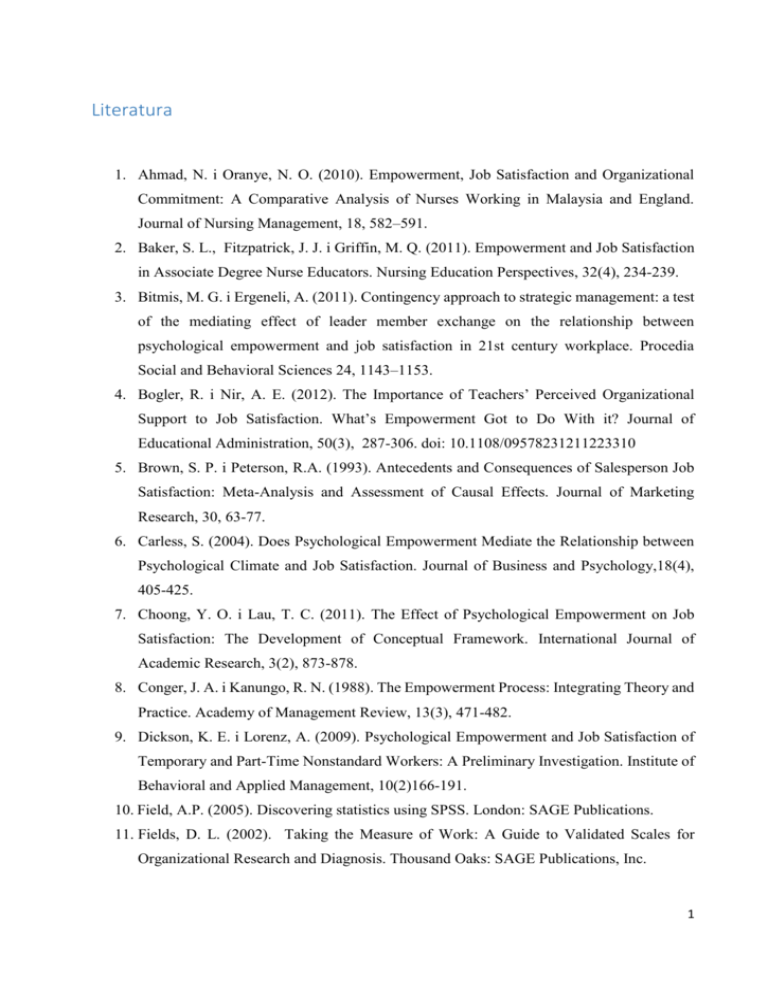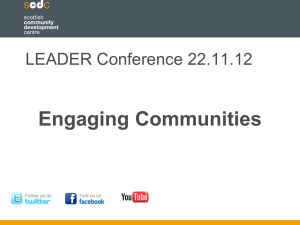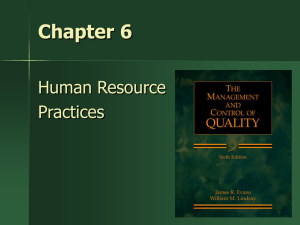Literatura
advertisement

Literatura 1. Ahmad, N. i Oranye, N. O. (2010). Empowerment, Job Satisfaction and Organizational Commitment: A Comparative Analysis of Nurses Working in Malaysia and England. Journal of Nursing Management, 18, 582–591. 2. Baker, S. L., Fitzpatrick, J. J. i Griffin, M. Q. (2011). Empowerment and Job Satisfaction in Associate Degree Nurse Educators. Nursing Education Perspectives, 32(4), 234-239. 3. Bitmis, M. G. i Ergeneli, A. (2011). Contingency approach to strategic management: a test of the mediating effect of leader member exchange on the relationship between psychological empowerment and job satisfaction in 21st century workplace. Procedia Social and Behavioral Sciences 24, 1143–1153. 4. Bogler, R. i Nir, A. E. (2012). The Importance of Teachers’ Perceived Organizational Support to Job Satisfaction. What’s Empowerment Got to Do With it? Journal of Educational Administration, 50(3), 287-306. doi: 10.1108/09578231211223310 5. Brown, S. P. i Peterson, R.A. (1993). Antecedents and Consequences of Salesperson Job Satisfaction: Meta-Analysis and Assessment of Causal Effects. Journal of Marketing Research, 30, 63-77. 6. Carless, S. (2004). Does Psychological Empowerment Mediate the Relationship between Psychological Climate and Job Satisfaction. Journal of Business and Psychology,18(4), 405-425. 7. Choong, Y. O. i Lau, T. C. (2011). The Effect of Psychological Empowerment on Job Satisfaction: The Development of Conceptual Framework. International Journal of Academic Research, 3(2), 873-878. 8. Conger, J. A. i Kanungo, R. N. (1988). The Empowerment Process: Integrating Theory and Practice. Academy of Management Review, 13(3), 471-482. 9. Dickson, K. E. i Lorenz, A. (2009). Psychological Empowerment and Job Satisfaction of Temporary and Part-Time Nonstandard Workers: A Preliminary Investigation. Institute of Behavioral and Applied Management, 10(2)166-191. 10. Field, A.P. (2005). Discovering statistics using SPSS. London: SAGE Publications. 11. Fields, D. L. (2002). Taking the Measure of Work: A Guide to Validated Scales for Organizational Research and Diagnosis. Thousand Oaks: SAGE Publications, Inc. 1 12. Gregson, T. (1987). Factor analysis of a multiple-choice format for job satisfaction. Psychological Reports 61, 747-750. 13. Hashmi, M. S., Hashmi, A. i Irshad, R. (2014). Job Satisfaction of Banking Personnel and Role of Psychological Empowerment: Empirical Evidence from Pakistan Banking Sector. Middle-East Journal of Scientific Research 19(2), 172-176. doi: 10.5829/idosi.mejsr.2014.19.2.1982 14. Hechanova, R. M., Alampay, R. B. A. i Franco, E. P. (2006). Psychological Empowerment, Job Satisfaction and Performance Among Filipino Service Workers. Asian Journal of Social Psychology, 9, 72–78. doi: 10.1111/J.1367-2223.2006.00177.X 15. Jex, S. M. (2002). Organizational psychology: a scientist-practitioner approach. New York: John Wiley & Sons, Inc. 16. Karim, F. i Rehman, O. (2012). Impact of Job Satisfaction, Perceived Organizational Justice and Employee Empowerment on Organizational Commitment in SemiGovernment Organizations of Pakistan. Journal of Business Studies Quarterly, 3(4), 92104. 17. Kasemsap, K. (2013). Innovative human resource practice: a synthesized framework and causal model of leader-member exchange, organizational justice, job satisfaction and organizational citizenship behavior. International Journal of e-Education, e-Business, eManagement and e-Learning, 3(1), 13-17. 18. Kinicki, A. J., McKee-Ryan, F. M., Schriesheim, C. A. i Carson, K. P. (2002). Assessing the Construct Validity of the Job Descriptive Index: A Review and Meta-Analysis. Journal of Applied Psychology, 87(1), 14–32. doi: 10.1037//0021-9010.87.1.14 19. Kirkman, B. L. i Rosen, B. (1999). Beyond Self-Management: Antecedents and Consequences of Team Empowerment. Academy of Management Journal, 42(1), 63-77. 20. Kolesarić, V. (2006). Analiza varijance u psihologijskim istraživanjima. Osijek: Filozofski fakultet Sveučilišta J. J. Strossmayera u Osijeku. 21. Krishna, Y. R. (2007). Psychological Empowerment and Organizational Commitment. The Icfai Journal of Organizational Behavior, 6(4), 26-36. 22. Laschinger, H. K. S., Finegan, J. i Shamian, J. (2001). Promoting Nurses´ Health: Effect of Empowerment on Job Strain and Work Satisfaction. Nursing Economics, 19(2), 42-52. 2 23. Laschinger, H. K. S., Finegan, J. E., Shamian, J. i Wilk, P. (2004). A Longitudinal Analysis of the Impact of Workplace Empowerment on Work Satisfaction. Journal of Organizational Behavior, 25, 527–545. 24. Lee, M. i Koh, J. (2001). Is empowerment really a new concept? International Journal of Human Resource Management, 12(4) 684–695 25. Liden, R. C., Wayne, S. J. i Sparrowe, R. T. (2000). An Examination of the Mediating Role of Psychological Empowerment on the Relations Between the Job, Interpersonal Relationships, and Work Outcomes. Journal of Applied Psychology , 85(3), 407-416. 26. Lin, L. F i Tseng, C. C. (2013). The Influence of Leadership Behavior and Psychological Empowerment on Job Satisfaction. The International Journal of Organizational Innovation, 5(4), 21-29. 27. Malik, I. i Farooqi, Y. A. (2013). Investigating the Effect of Transformational Leadership as a Moderator, Between Employees’ Psychological Empowerment And Employees’ Job Satisfaction Relationship. International Journal of Multidisciplinary Sciences and Engineering, 4(7), 37-42. 28. Menon, S. T. (2001). Employee Empowerment: An Integrative Psychological Approach. Applied Psychology: An International Review, 50(1), 153-180. 29. Najafi, S., Noruzy, A., Azar, H. K., Nazari-Shirkouhi, S. i Dalvand, M. R. (2011). Investigating the Relationship Between Organizational Justice, Psychological Empowerment, Job Satisfaction, Organizational Commitment and Organizational Citizenship Behavior: An Empirical Model. African Journal of Business Management, 5(13), 5241-5248. doi: 10.5897/Ajbm10.1505 30. Rae, K. (2013). How perceptions of empowerment and commitment affect job satisfaction: a study of managerial-level effects. Accounting, Accountability & Performance, 18(1), 35162. 31. Saif, N. I. i Saleh, A. S. (2013). Psychological Empowerment and Job Satisfaction in Jordanian Hospitals. International Journal of Humanities and Social Science 3(16), 250257. 32. Seibert, S. E., Wang, G., i Courtright, S. H. (2011). Antecedents and consequences of psychological and team empowerment in organizations: A meta-analytic review. Journal of Applied Psychology, 96, 981-1003. 3 33. Sood, A. (2007). Empowerment effects across cultures (Doktorska disertacija). Birmingham: Aston University. 34. Spreitzer, G. M. (2007). Taking Stock: A review of more than twenty years of research on empowerment at work. U C. C. Cooper i J. Barling (Ur.), The Handbook of Organizational Behavior (str. 54-72). London: Sage Publications. 35. Spreitzer, G. M. (1996). Social structural characteristics of psychological empowerment. Academy of Management Journal, 39(2), 483-504. 36. Spreitzer, G. M. (1995). Psychological empowerment in the workplace: Dimensions, measurement, and validation. Academy of Management Journal, 38(5), 1442-1465. 37. Spreitzer, G. M., Kizilos, M. A. i Nason, S. W. (1997). A Dimensional Analysis of the Relationship Between Psychological Empowerment and Effectiveness, Satisfaction and Strain. Journal of Management, 23(5), 679-704. 38. Sušanj, Z. i Jakopec, A. (2012). Fairness Perceptions and Job Satisfaction as Mediators of the Relationship between Leadership Style and Organizational Commitment. Psychological Topics 21(3), 509-526. 39. Šverko, B. (2005). Supresor varijabla. U B. Petz (Ur.), Psihologijski rječnik (str. 479). Jastrebarsko: Naklada Slap. 40. Tadić, M. (2005). Moderatorski i medijacijski utjecaj samopoštovanja na odnos temeljnih crta ličnosti i neverbalnih socijalnih vještina (Diplomski rad). Zagreb: Studij psihologije Hrvatskih studija. 41. Taghipour, A. i Khadem Dezfuli, Z. (2013). Designing and Testing a Model of Antecedents of Work Engagement. Procedia - Social and Behavioral Sciences 84, 149 – 154. doi: 10.1016/j.sbspro.2013.06.526 42. Thomas, K. W. i Velthouse, B. A. (1990). Cognitive Elements of Empowerment: An ˝Interpretive˝ Model of Intrinsic Task Motivation. Academy of Management Review, 15(4), 666-681. 43. Tsai, M. C. (2012). An Empirical Study of the Conceptualization of Overall Organizational Justice and Its Relationship with Psychological Empowerment, Organizational Commitment and Turnover Intention in Higher Education (doktorska disertacija). Washington: University of Washington 44. Wang, G. i Lee, P. D. (2009). Psychological Empowerment and Job Satisfaction: An Analysis of Interactive Effects. Group & Organization Management, 34(3), 271-296. 4 45. Yang, X. i Wang, W. (2013). Exploring the Determinants of Job Satisfaction of Civil Servants in Beijing, China. Public Personnel Management 42(4), 566-587. doi: 10.1 177/0091026013502169 46. Zhang, X. i Bartol, K. M. (2010). Linking Empowering Leadership and Employee Creativity: The Influence of Psychological Empowerment, Intrinsic Motivation, and Creative Process Engagement. Academy of Management Journal, 53(1), 107–128. 5








